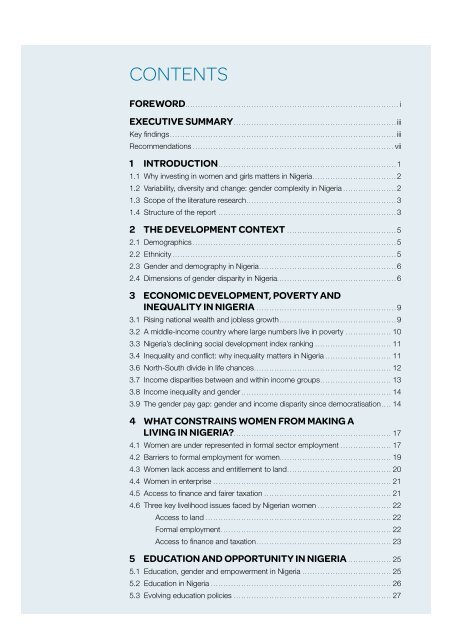Gender in niGeria report 2012 - Economic Commission for Africa
Gender in niGeria report 2012 - Economic Commission for Africa
Gender in niGeria report 2012 - Economic Commission for Africa
Create successful ePaper yourself
Turn your PDF publications into a flip-book with our unique Google optimized e-Paper software.
Contents<br />
FOREWORD.....................................................................................i<br />
EXECUTIVE SUMMARY.................................................................iii<br />
Key f<strong>in</strong>d<strong>in</strong>gs..........................................................................................iii<br />
Recommendations................................................................................vii<br />
1 INTRODUCTION.......................................................................1<br />
1.1 Why <strong>in</strong>vest<strong>in</strong>g <strong>in</strong> women and girls matters <strong>in</strong> Nigeria..................................2<br />
1.2 Variability, diversity and change: gender complexity <strong>in</strong> Nigeria......................2<br />
1.3 Scope of the literature research............................................................3<br />
1.4 Structure of the <strong>report</strong>.......................................................................3<br />
2 the DEVELOPMENT CONTEXT............................................5<br />
2.1 Demographics.................................................................................5<br />
2.2 Ethnicity.........................................................................................5<br />
2.3 <strong>Gender</strong> and demography <strong>in</strong> Nigeria.......................................................6<br />
2.4 Dimensions of gender disparity <strong>in</strong> Nigeria...............................................6<br />
3 ECONOMIC DEVELOPMENT, POVERTY AND<br />
INEQUALITY IN NIGERIA........................................................9<br />
3.1 Ris<strong>in</strong>g national wealth and jobless growth...............................................9<br />
3.2 A middle-<strong>in</strong>come country where large numbers live <strong>in</strong> poverty................... 10<br />
3.3 Nigeria’s decl<strong>in</strong><strong>in</strong>g social development <strong>in</strong>dex rank<strong>in</strong>g............................... 11<br />
3.4 Inequality and conflict: why <strong>in</strong>equality matters <strong>in</strong> Nigeria........................... 11<br />
3.6 North-South divide <strong>in</strong> life chances....................................................... 12<br />
3.7 Income disparities between and with<strong>in</strong> <strong>in</strong>come groups............................. 13<br />
3.8 Income <strong>in</strong>equality and gender............................................................ 14<br />
3.9 The gender pay gap: gender and <strong>in</strong>come disparity s<strong>in</strong>ce democratisation..... 14<br />
4 WHAT CONSTRAINS WOMEN FROM MAKING A<br />
LIVING IN NIGERIA?............................................................... 17<br />
4.1 Women are under represented <strong>in</strong> <strong>for</strong>mal sector employment..................... 17<br />
4.2 Barriers to <strong>for</strong>mal employment <strong>for</strong> women............................................ 19<br />
4.3 Women lack access and entitlement to land.......................................... 20<br />
4.4 Women <strong>in</strong> enterprise....................................................................... 21<br />
4.5 Access to f<strong>in</strong>ance and fairer taxation................................................... 21<br />
4.6 Three key livelihood issues faced by Nigerian women.............................. 22<br />
Access to land.......................................................................... 22<br />
Formal employment.................................................................... 22<br />
Access to f<strong>in</strong>ance and taxation...................................................... 23<br />
5 EDUCATION AND OPPORTUNITY IN NIGERIA.................. 25<br />
5.1 Education, gender and empowerment <strong>in</strong> Nigeria.................................... 25<br />
5.2 Education <strong>in</strong> Nigeria........................................................................ 26<br />
5.3 Evolv<strong>in</strong>g education policies............................................................... 27

















